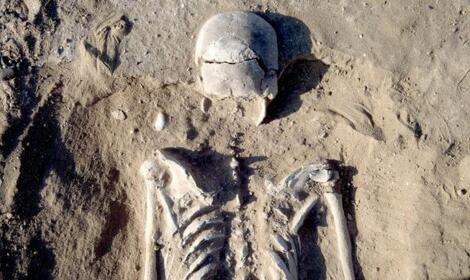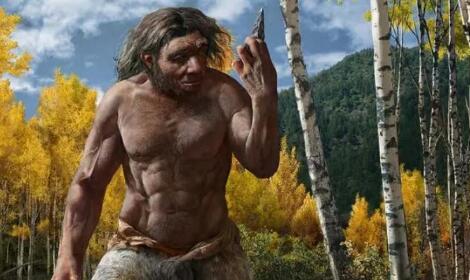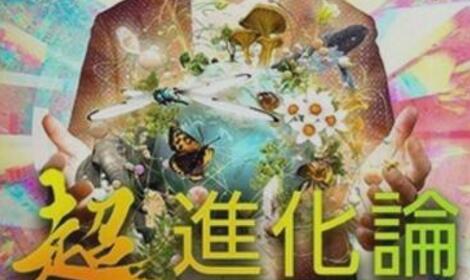(下)据估计,现代人类大约有20万年的历史,但似乎99%的技术进步都发生在过去的1万年里。在那之前我们在做什么?
正文翻译

Modern humans are estimated to be about 200,000 years old, but it seems that 99% of technological progress has occurred in the last 10,000 years. What were we doing before that?
据估计,现代人类大约有20万年的历史,但似乎99%的技术进步都发生在过去的1万年里。在那之前我们在做什么?

Modern humans are estimated to be about 200,000 years old, but it seems that 99% of technological progress has occurred in the last 10,000 years. What were we doing before that?
据估计,现代人类大约有20万年的历史,但似乎99%的技术进步都发生在过去的1万年里。在那之前我们在做什么?
评论翻译
Marc Srour
CORRECTION: What I wrote below is overstated. It's a false dichotomy to consider agriculture as a "higher step" from hunting-gathering. Different tribes and cultures developed a variety of ways and technologies to hunt-gather, depending on what they were trying to acquire (e.g. development of fishing gear). It's also been known since the 60s that hunter-gatherers have more leisure time than agricultures, and that they're not actually "scraping by". So these things all lie on a continuum, and it was deceptive and misleading of me to state agriculture as the silver bullet.
It's not what we were doing, but what we weren't doing: agriculture. Before 10-11 ka, there were some basic forms of agriculture, but with the end of the last large Ice Age came favourable changes in climate that was our lucky break.
更正:我下面所写的有些言过其实。
认为农业比狩猎采集“更高一级”是错误的两分法。不同的部落和文化根据他们想要获得的东西(如渔具的开发),发展了各种各样的狩猎采集方式和技术。从60年代开始,人们就知道狩猎采集者比农民有更多的闲暇时间,而且他们实际上并不是“勉强度日”。所以这些事情都是连续的,我把农业说成是灵丹妙药是一种欺骗和误导。
这不是我们曾经在做什么,而是我们没有做什么:农业。在很古老的年代,有一些基本的农业形式,但随着最后一次大冰河期的结束,气候发生了有利的变化,这是我们幸运的突破。
The change in climate allowed societies to develop a yearly sustainable agricultural system that allowed sedentary societies to develop, as the climate favoured tubers and but/grain producing plants which could be planted and harvested in a regular cycle.
Thus the hunter-gatherers became farmers. As yields increased along with domestication of crop plants, surpluses were created, allowing the settlements and populations to grow, eventually becoming civilisations. Obviously, not everyone would then become a hunter or farmer or tool-maker. These people would instead devote themselves to more intellectual pursuits, which leads to technological progress.
气候的变化使社会能够发展出一种每年可持续的农业体系,使定居的社会得以发展,因为气候有利于块茎和可生产谷物的植物,这些植物可以定期种植和收获。
这样,狩猎采集者就变成了农民。随着作物的驯化和产量的增加,产生了盈余,使定居点和人口增长,最终形成了文明。显然,不是每个人都会成为猎人、农民或工具制造者。相反,这些人会致力于更多的智力追求,这又导致了技术进步。
Gerhard Adam
There are some very good answers provided, but there's also an assumption that always accompanies such questions. That assumption is that somehow human technical achievements were achieved by ALL humans.
In truth, human achievements are the result of a unique social structure and not base intelligence. In other words, it is the social organization and the developments of that infrastructure that facilitates the advances created by a few rare individuals and allows the majority to capitalize on that.
The average human understands little to nothing about the world they inhabit and virtually everything they have come to depend on is provided by thousands of other humans, who equally lack the understanding. As a result, each individual does their tiny part and benefits because the social organization ensures it, but not because as individual humans they possess the skills or knowledge.
这里有一些优质的答复。但也有一个假设总是伴随着这样的问题。这个假设是,人类的技术成就在某种程度上是由所有人类实现的。
事实上,人类的成就是独特的社会结构的结果,而不是基础智力的结果。换句话说,正是社会组织和基础设施的发展促进了少数人创造的进步,并允许大多数人从中获利。
一般人对他们所居住的世界几乎一无所知,他们所依赖的几乎所有东西都是由成千上万的其他人提供的,而这些人同样缺乏理解。因此,每个人都尽了自己的一份绵薄之力,并从中受益,因为社会组织保证了这一点,而不是因为作为个体的他们拥有技能或知识。
Scott Young
Generally we were hunter / gatherers then we discovered beer!
Really - not a joke answer.
Most of this is gleaned from a book called "The History of the World in Six Glasses" that I read a few years back.
About 10,000 years ago, hunter / gatherers realized that it was pretty easy to gather a lot of food by harvesting grains - too much in fact. So they dug holes in the ground, lined them with rocks and filled them with the extra grain for a future day. This was in the Fertile Crescent (Iraq / Iran) and it was generally pretty hot and dry. Sometimes it rains and some of the holes got very wet, the grain, sprouted and mixed with natural yeasts and formed a crude beer.
If you could stay in one place for a while and easily gather food, why not? Until they figured out beer, the reason was dysentery from bad water. But if you drank beer, you did not get sick (magic). So now you have a good source of food and a drink from the Gods that kept you from getting sick. Early religious rites probably were centred on the drinking of beer to get drunk and talk to the gods (a tradition carried on by binge drinking frat boys to this day).
Now it is worth the time to build a good building to live in and another to store your grain in.
On your mark, get set, GO!
一般来说,我们是猎人/采集者,然后我们发现了啤酒!真的,不是开玩笑。
其中大部分摘自我几年前读过的一本名为《六个玻璃杯中的世界史》(The History of the World in Six Glasses)的书。
大约1万年前,狩猎者/采集者意识到通过收割谷物很容易收集大量食物——实际上是太多了。于是他们在地上挖了几个洞,用石头垫起来,填上多余的谷物,以备将来之需。这就是新月沃土(伊拉克/伊朗),通常非常炎热和干燥。有时下雨,一些洞变得非常潮湿,谷物发芽,与天然酵母混合,形成了一种粗糙的啤酒。
如果你能在一个地方待上一段时间,而且很容易就能收集到食物,为什么不呢?在他们发现啤酒之前,原因是变质水引起的痢疾。但如果你喝啤酒,你就不会生病(魔法)。所以现在你有了来自诸神的良好食物和饮料,使你免于生病。早期的宗教仪式可能集中在喝啤酒以喝醉的状态与神交谈(这一传统由酗酒的兄弟会男孩延续至今)。
现在值得花时间去建造一幢好房子来居住,另一幢用来储存粮食。
各就各位,预备,出发!
Harsh Kumar
We were doing (before 10000 years) what we are doing today. It's just a matter of perception. A million years from now people will think that their ancestors from 2000 A.D were stupid and doing nothing. They will be sentient energy beings and will be laughing at our stupid inventions like electricity and cell phones and planes. They will be asking the same stupid question a million years from now to Quora(Quora most probably will also be a living thing then). Human species have a very poor long term memory. They tend to forget their ancestors contribution.
我们(在1万年前)正在做我们今天正在做的事情。
这只是一个感知问题。一百万年后,人们会认为他们的祖先从公元2000年开始,当时的人很蠢,毫无成就。他们会是有知觉的能量生物,会嘲笑我们愚蠢的发明,比如电力、手机和飞机。
一百万年后,他们会问Quora同样愚蠢的问题(到那时,Quora很可能也会有生命)。人类的长期记忆能力很差。他们往往忘记了他们祖先的贡献。
Paul Mulwitz
I do not accept the premise of this question. I don't think virtually all progress for humans took place in the last 10,000 years.
What took place over that period was the recording of human progress. Writing was invented around 10,000 years ago. It took a while to become popular. Indeed it is only in the last few centuries where the notion that everyone should know how to read and write became a popular idea. Before that it was only priests, monks, and Jews who were literate in the West.
我不接受这个问题的前提。我不认为人类的所有进步都发生在过去的一万年里。这一时期发生的事情是人类进步的记录。书写发明于大约一万年前。它花了一段时间才流行起来。事实上,只是在过去的几个世纪里,每个人都应该知道如何阅读和写作的概念才成为一个流行的想法。在此之前,西方只有牧师、僧侣和犹太人有文化。
Before history started being written there were many major developments in human culture and experience. We learned to control fire and cook food. Indeed without this there would be no humans. We learned to make tools and decorative items from sea shells, stones, and eventually metals. We learned to make clothing. We learned to make war with our neighbors. We became the true kings of the jungle - the most feared predators in the world. We learned to build houses of all sorts from tents to masonry buildings.
So while human history suggests nearly all of human progress has happened in the last 10,000 years I think this is a remnant from the fact that recording history covers that same time period. Human development occurred for a long time and in many ways before history started recording human progress.
在开始书写历史之前,人类文化和经验有了许多重大发展。我们学会了控制火和做饭。事实上,没有它就没有人类。我们学会了用贝壳、石头和金属制作工具和装饰品。我们学会了做衣服。我们学会了与邻居开战。我们成为了真正的丛林之王——世界上最可怕的掠食者。我们学会了建造各种各样的房子,从帐篷到砖石建筑。
所以,虽然人类历史表明,几乎所有的人类进步都发生在过去的一万年里,但我认为这是历史记录覆盖同一时期的一个遗存。在历史开始记录人类进步之前,人类的发展在很多方面已经发生了很长时间。
Nikola Stamatovic
The shortest possible answer: communication. Until people developed language they couldn't make much progress, cause they couldn't transfer their knowledge. When the knowledge became too wast to be told they made up the letter system and a ways to store written things. They stagnated for a while until they developed press for printing. Afterwards it was obvious what happened. We strive for information that is knowledge through communication. That's how we make progress!
最简短的答案是:沟通。直到人们学会了语言,他们才能取得很大的进步,因为(没有语言)他们不能转移他们的知识。当知识会被浪费而不能被传播时,他们就创造了字母系统和一种储存书面材料的方法。
他们停滞了一段时间,直到他们发明了印刷机。后来发生的事情就很明显了。我们努力通过交流获取信息,即知识。这就是我们进步的方式!
Mandi Smallhorne
Skimming through the answers, it seems that most people think agriculture was a great idea, cities are wonderful innovations and before 10,000 years ago, human life was 'nasty, brutish and short'.
To start with, our lifespan was quite long back then - it dropped dramatically with the advent of agirculture, which a) saw us become reliant on a few cereal crops instead of gathering wide varieties of food that gave us a better nutritional profile and b) crammed us together so that we could develop sanitation problems (no such problems for Bushmen in the Kalahari - pop behind the nearest bush, you'll be moving on tomorrow or the next day) and pick up zoonoses from the animals we'd domesticated. Bunched up together like that, infectious disease - not a hunter-gatherer problem - could become epidemic.Oh, and war would only occur where resources were scarce. In the world of more than 10,000 years ago, that wasn't often going to be a major issue.
浏览一下答案,大多数人似乎认为农业是一个伟大的想法,城市是美妙的创新,而在1万年前,人类的生活是“肮脏、野蛮和短暂的”。
首先,当时我们的寿命相当长,但随着农业的出现,寿命急剧下降,因为:
1. 我们变得依赖于少数几种谷类作物,而不是收集各种各样的食物,这些食物给我们提供了更好的营养状况;
2. 把我们挤在一起,这样我们就会出现卫生问题(卡拉哈里沙漠的布须曼人没有这样的问题——躲在最近的灌木丛后面,你明天或后天就会离开),从我们驯化的动物身上感染人畜共患病。像这样聚集在一起,传染病可能会成为流行病,而狩猎采取社会不会面临这样的问题。哦,战争只会发生在资源稀缺的地方。在一万多年前的世界里,这通常不是一个大问题。
And we had leisure - did we have leisure! Many hunter-gatherer societies only had to work for a few hours each day to feed themselves. The rest of the time was spent playing, making beads and other crafts, telling stories, painting pictures, dancing and no doubt figuring out from endless star-gazing under perfect conditions that the earth wasn't flat.
Just because it wasn't recorded doesn't mean it was horrible and shew, we should be so relieved we left all THAT behind. I think we've hurt ourselves quite badly in the last 10,000 years (although I wouldn't want to be without much of what I enjoy today) and damaged our planet in ways that may mean she's no longer hospitable to us in future. So the last 10,000 years is not all upward and onward, and the millennia before that weren't all savage and nasty.
Read Jared Diamond's latest book, The World Until Yesterday, to get some idea of the pros and cons of The Way We Were.
我们有闲暇,我们有闲暇!
许多狩猎采集社会每天只需要工作几个小时就能养活自己。其余的时间都用来玩、做珠子和其他工艺品、讲故事、画画、跳舞,毫无疑问,在完美的条件下,通过无休止的观星,他们发现地球不是平的。
仅仅因为它没有被记录下来,并不意味着那段时期是可怕的,我们应该感到欣慰,因为我们把所有这些都抛在了身后。我认为,在过去的一万年里,我们已经严重伤害了自己(尽管我不想失去我今天喜欢的东西),并以某种方式破坏了我们的星球,这可能意味着未来她不再适合我们居住。所以过去的一万年并不都是向上和前进的,在那之前的时代也不都是野蛮和肮脏的。
读一下贾里德·戴蒙德的新书《直到昨天的世界》(The World Until Yesterday),你会对过去的我们的利弊有所了解。
Abe Lewis
There's a lot of relevant information here, but one critical fact has been largely overlooked: For most of human history, humans have been killing, oppressing, and exploiting each other--that tends to cripple technological progress. To quote from Abe Lewis' answer to another question:
Humans have been brilliant since before the dawn of history. All over the world ancient civilizations made insights that even impress us today. Unfortunately, the vast majority of humans were far too busy killing and oppressing and/or being killed and oppressed by each other to take advantage of what was learned.
这里有很多相关的信息,但一个关键的事实在很大程度上被忽视了:在人类历史的大部分时间里,人类一直在互相残杀、压迫和剥削——这往往会削弱技术进步。引用Abe Lewis对另一个问题的回答:
人类在历史出现之前就已经很辉煌了。世界各地古代文明的深刻见解至今仍令我们印象深刻。不幸的是,绝大多数人类忙于杀戮和压迫,或被彼此杀害和压迫,而没有利用所学到的东西。
Two moral innovations that had been invented far away and centuries, if not millennia, earlier finally took root in Europe and slowly, for the first time, came into widespread and lasting practice. One of these innovations was a valuing of criticism as a helpful and good thing instead of a negative thing. The other innovation, which was no doubt related, was acknowledgement of and respect for the rights of other humans, and with it a refusal to use violence against those humans. The first innovation launched a sustained and accelerating growth in knowledge, and the second innovation allowed the masses to participate in that growth and reap its benefits.
EDIT: Let me emphasize this point with an example. Many of the other answers here have been pointing to the exponential growth of population or slow compound growth of technology, but this largely misses the point, and I'll explain why:
早在几百年前,甚至几千年前,在遥远的地方发明的两项道德创新终于在欧洲扎根,并第一次慢慢地,广泛而持久地实施。其中一项创新就是将批评视为有益的好事,而不是坏事。另一项毫无疑问相关的创新是承认和尊重其他人的权利,并拒绝对这些人使用暴力。第一次创新推动了知识的持续和加速增长,第二次创新使大众参与到这种增长中来并从中受益。
编辑:让我用一个例子来强调这一点。这里的许多其他答案都指向了人口的指数级增长或技术的缓慢复合增长,但这在很大程度上没有抓住重点,我将解释为什么:
Let's forget 200,000 years ago, and assume that, say 6,000 years ago there were only two humans alive on this earth, call them Adam and Eve. And let's assume that the population growth rate was a very modest rate by modern standards, .04% (like Italy, 1978). (To give you an idea of how low that is by modern standards, the growth rate in sub-Saharan Africa, probably the poorest and most disease and starvation prone region on earth, is about 2%; the global growth rate is at its century low at about 1%, at the moment, and was as high as 2.2% in 1963.)
So, in 6,000 years from only two people at a .4% growth rate, what would the global population be today? Over 52 billion. In other words, we know for a fact that modern population growth is not a continuation of tiny compound growth over hundreds of millenia. Instead, we must conclude that some time in the last few thousand years, the population growth rate itself must have begun to fundamentally change. So the population we see today is a symptom, not a cause of advancement.
让我们忘记20万年前,假设6000年前地球上只有两个人,叫他们亚当和夏娃。让我们假设人口增长率按照现代标准是一个非常温和的增长率,0.4%(像意大利,1978年)。(用现代标准来衡量,告诉你这个数字有多低:在撒哈拉以南非洲,可能是地球上最贫穷、最容易发生疾病和饥饿的地区,增长率约为2%;目前,全球经济增长率约为1%,是本世纪以来的最低水平,而1963年曾高达2.2%。)
那么,6000年后,从只有两个人,以0.4%的速度增长,今天的全球人口会是多少?超过520亿。换句话说,我们知道一个事实,即现代人口增长不是数百年微小复合增长的延续。相反,我们必须得出这样的结论:在过去几千年的某个时候,人口增长率本身肯定已经开始发生根本变化。所以我们今天看到的人口是进步的征兆,而不是原因。
We cannot quantify technological advancement like we can quantify population growth, but I have already given a reason why we can believe that the technological innovation we see today is not a mere continuation of compound growth since ancient times: that is, many very significant technological and scientific discoveries and advancements were made throughout history, but were not utilized and frequently even forgotten. Thus I think we have reason to suspect that the nature of technological innovation also changed.
As I have already suggested, I think that change was an application of moral innovation, valuing of criticism and respecting the rights of humans.
我们不能像量化人口增长那样量化技术进步,但我已经给出了一个理由,为什么我们可以相信我们今天看到的技术创新不仅仅是自古以来复合增长的延续:也就是说,历史上有许多非常重要的技术和科学发现和进步,但没有被利用,甚至经常被遗忘。因此,我认为我们有理由怀疑技术创新的性质也发生了变化。
正如我已经说过的,我认为(真正的)变革是道德创新、重视批评和尊重人类权利的应用。
Tina Murphy
Surviving, inventing, learning and adapting. Kind of arrogant for modern man to say that most of the technology has only been in the last 10,000 years. Depend on what kind of technology you are talking about. Metal mechanisms? What about farming, travel, hunting, shelter, diet technologies? Hybrids in grains. Astrological calendars. Metallurgy. Ancient man was not dumb. Neither were the other humanoids they had to compete for resources with.
生存、发明、学习和适应。现代人说大多数技术都是在过去一万年里才出现的,这有点自大。这取决于你谈论的是哪种技术。金属机制?耕作、旅行、狩猎、住所和饮食技术?
杂交、占星术的日历、冶金学?
古人并不是傻子,与他们竞争资源的其他类人生物也不是。
Mike Grimshaw
Staying alive. It all comes down to SURVIVABLE writing which allows us to stand on the shoulders of giants, who in turn stood on the giants before them.
You can find quadratic equations & commodities markets on clay tablets written in Akkadian (with Sumerian mixed in for good measure). We all know about the Egyptian's engineering. Survivable writing allows for both data & narrative to be "remembered" across generations and in turn both challenged and/or upheld.
Why do I say "survivable"? Because we have infinitely more middle and late Bronze Age Akkadian than we do of some other semitic dialects. Why? Because it was written on clay tablets and not animal skin.
If you write on animal skins and want it to last for a few thousand years you better either memorize it (yes, it was done and pretty well too) or stick it in a clay jar in a hot, arid cave at the bottom of the world that isn't covered by water.
We're not smarter so much. We've just got REALLY tall shoulders we're standing on.
为了活着。
这一切都归结于基于“存活下来”的文字记录,它让我们站在巨人的肩膀上,而巨人又站在他们其他巨人身上。你可以在用阿卡德语写的泥板上找到二次方程和商品市场(为了更准确地表述,与苏美尔语混写)。我们都知道埃及人的工程技术。文字记录允许数据和叙述被几代人“记住”,反过来进一步改良。
为什么我说“存活下来”?因为我们青铜时代中后期的阿卡德文字比其他闪米特语方言要多得多。为什么?因为它是写在泥板上而不是动物皮上。如果你在动物皮上写字,想让它保存几千年,你最好要么把它记下来(是的,有人写过,而且写得很好),要么把它放在一个陶罐里,放在世界底部一个炎热干旱、没有水覆盖的洞穴里。
我们没那么聪明。我们只是站在非常高的肩膀上。
CORRECTION: What I wrote below is overstated. It's a false dichotomy to consider agriculture as a "higher step" from hunting-gathering. Different tribes and cultures developed a variety of ways and technologies to hunt-gather, depending on what they were trying to acquire (e.g. development of fishing gear). It's also been known since the 60s that hunter-gatherers have more leisure time than agricultures, and that they're not actually "scraping by". So these things all lie on a continuum, and it was deceptive and misleading of me to state agriculture as the silver bullet.
It's not what we were doing, but what we weren't doing: agriculture. Before 10-11 ka, there were some basic forms of agriculture, but with the end of the last large Ice Age came favourable changes in climate that was our lucky break.
更正:我下面所写的有些言过其实。
认为农业比狩猎采集“更高一级”是错误的两分法。不同的部落和文化根据他们想要获得的东西(如渔具的开发),发展了各种各样的狩猎采集方式和技术。从60年代开始,人们就知道狩猎采集者比农民有更多的闲暇时间,而且他们实际上并不是“勉强度日”。所以这些事情都是连续的,我把农业说成是灵丹妙药是一种欺骗和误导。
这不是我们曾经在做什么,而是我们没有做什么:农业。在很古老的年代,有一些基本的农业形式,但随着最后一次大冰河期的结束,气候发生了有利的变化,这是我们幸运的突破。
The change in climate allowed societies to develop a yearly sustainable agricultural system that allowed sedentary societies to develop, as the climate favoured tubers and but/grain producing plants which could be planted and harvested in a regular cycle.
Thus the hunter-gatherers became farmers. As yields increased along with domestication of crop plants, surpluses were created, allowing the settlements and populations to grow, eventually becoming civilisations. Obviously, not everyone would then become a hunter or farmer or tool-maker. These people would instead devote themselves to more intellectual pursuits, which leads to technological progress.
气候的变化使社会能够发展出一种每年可持续的农业体系,使定居的社会得以发展,因为气候有利于块茎和可生产谷物的植物,这些植物可以定期种植和收获。
这样,狩猎采集者就变成了农民。随着作物的驯化和产量的增加,产生了盈余,使定居点和人口增长,最终形成了文明。显然,不是每个人都会成为猎人、农民或工具制造者。相反,这些人会致力于更多的智力追求,这又导致了技术进步。
Gerhard Adam
There are some very good answers provided, but there's also an assumption that always accompanies such questions. That assumption is that somehow human technical achievements were achieved by ALL humans.
In truth, human achievements are the result of a unique social structure and not base intelligence. In other words, it is the social organization and the developments of that infrastructure that facilitates the advances created by a few rare individuals and allows the majority to capitalize on that.
The average human understands little to nothing about the world they inhabit and virtually everything they have come to depend on is provided by thousands of other humans, who equally lack the understanding. As a result, each individual does their tiny part and benefits because the social organization ensures it, but not because as individual humans they possess the skills or knowledge.
这里有一些优质的答复。但也有一个假设总是伴随着这样的问题。这个假设是,人类的技术成就在某种程度上是由所有人类实现的。
事实上,人类的成就是独特的社会结构的结果,而不是基础智力的结果。换句话说,正是社会组织和基础设施的发展促进了少数人创造的进步,并允许大多数人从中获利。
一般人对他们所居住的世界几乎一无所知,他们所依赖的几乎所有东西都是由成千上万的其他人提供的,而这些人同样缺乏理解。因此,每个人都尽了自己的一份绵薄之力,并从中受益,因为社会组织保证了这一点,而不是因为作为个体的他们拥有技能或知识。
Scott Young
Generally we were hunter / gatherers then we discovered beer!
Really - not a joke answer.
Most of this is gleaned from a book called "The History of the World in Six Glasses" that I read a few years back.
About 10,000 years ago, hunter / gatherers realized that it was pretty easy to gather a lot of food by harvesting grains - too much in fact. So they dug holes in the ground, lined them with rocks and filled them with the extra grain for a future day. This was in the Fertile Crescent (Iraq / Iran) and it was generally pretty hot and dry. Sometimes it rains and some of the holes got very wet, the grain, sprouted and mixed with natural yeasts and formed a crude beer.
If you could stay in one place for a while and easily gather food, why not? Until they figured out beer, the reason was dysentery from bad water. But if you drank beer, you did not get sick (magic). So now you have a good source of food and a drink from the Gods that kept you from getting sick. Early religious rites probably were centred on the drinking of beer to get drunk and talk to the gods (a tradition carried on by binge drinking frat boys to this day).
Now it is worth the time to build a good building to live in and another to store your grain in.
On your mark, get set, GO!
一般来说,我们是猎人/采集者,然后我们发现了啤酒!真的,不是开玩笑。
其中大部分摘自我几年前读过的一本名为《六个玻璃杯中的世界史》(The History of the World in Six Glasses)的书。
大约1万年前,狩猎者/采集者意识到通过收割谷物很容易收集大量食物——实际上是太多了。于是他们在地上挖了几个洞,用石头垫起来,填上多余的谷物,以备将来之需。这就是新月沃土(伊拉克/伊朗),通常非常炎热和干燥。有时下雨,一些洞变得非常潮湿,谷物发芽,与天然酵母混合,形成了一种粗糙的啤酒。
如果你能在一个地方待上一段时间,而且很容易就能收集到食物,为什么不呢?在他们发现啤酒之前,原因是变质水引起的痢疾。但如果你喝啤酒,你就不会生病(魔法)。所以现在你有了来自诸神的良好食物和饮料,使你免于生病。早期的宗教仪式可能集中在喝啤酒以喝醉的状态与神交谈(这一传统由酗酒的兄弟会男孩延续至今)。
现在值得花时间去建造一幢好房子来居住,另一幢用来储存粮食。
各就各位,预备,出发!
Harsh Kumar
We were doing (before 10000 years) what we are doing today. It's just a matter of perception. A million years from now people will think that their ancestors from 2000 A.D were stupid and doing nothing. They will be sentient energy beings and will be laughing at our stupid inventions like electricity and cell phones and planes. They will be asking the same stupid question a million years from now to Quora(Quora most probably will also be a living thing then). Human species have a very poor long term memory. They tend to forget their ancestors contribution.
我们(在1万年前)正在做我们今天正在做的事情。
这只是一个感知问题。一百万年后,人们会认为他们的祖先从公元2000年开始,当时的人很蠢,毫无成就。他们会是有知觉的能量生物,会嘲笑我们愚蠢的发明,比如电力、手机和飞机。
一百万年后,他们会问Quora同样愚蠢的问题(到那时,Quora很可能也会有生命)。人类的长期记忆能力很差。他们往往忘记了他们祖先的贡献。
Paul Mulwitz
I do not accept the premise of this question. I don't think virtually all progress for humans took place in the last 10,000 years.
What took place over that period was the recording of human progress. Writing was invented around 10,000 years ago. It took a while to become popular. Indeed it is only in the last few centuries where the notion that everyone should know how to read and write became a popular idea. Before that it was only priests, monks, and Jews who were literate in the West.
我不接受这个问题的前提。我不认为人类的所有进步都发生在过去的一万年里。这一时期发生的事情是人类进步的记录。书写发明于大约一万年前。它花了一段时间才流行起来。事实上,只是在过去的几个世纪里,每个人都应该知道如何阅读和写作的概念才成为一个流行的想法。在此之前,西方只有牧师、僧侣和犹太人有文化。
Before history started being written there were many major developments in human culture and experience. We learned to control fire and cook food. Indeed without this there would be no humans. We learned to make tools and decorative items from sea shells, stones, and eventually metals. We learned to make clothing. We learned to make war with our neighbors. We became the true kings of the jungle - the most feared predators in the world. We learned to build houses of all sorts from tents to masonry buildings.
So while human history suggests nearly all of human progress has happened in the last 10,000 years I think this is a remnant from the fact that recording history covers that same time period. Human development occurred for a long time and in many ways before history started recording human progress.
在开始书写历史之前,人类文化和经验有了许多重大发展。我们学会了控制火和做饭。事实上,没有它就没有人类。我们学会了用贝壳、石头和金属制作工具和装饰品。我们学会了做衣服。我们学会了与邻居开战。我们成为了真正的丛林之王——世界上最可怕的掠食者。我们学会了建造各种各样的房子,从帐篷到砖石建筑。
所以,虽然人类历史表明,几乎所有的人类进步都发生在过去的一万年里,但我认为这是历史记录覆盖同一时期的一个遗存。在历史开始记录人类进步之前,人类的发展在很多方面已经发生了很长时间。
Nikola Stamatovic
The shortest possible answer: communication. Until people developed language they couldn't make much progress, cause they couldn't transfer their knowledge. When the knowledge became too wast to be told they made up the letter system and a ways to store written things. They stagnated for a while until they developed press for printing. Afterwards it was obvious what happened. We strive for information that is knowledge through communication. That's how we make progress!
最简短的答案是:沟通。直到人们学会了语言,他们才能取得很大的进步,因为(没有语言)他们不能转移他们的知识。当知识会被浪费而不能被传播时,他们就创造了字母系统和一种储存书面材料的方法。
他们停滞了一段时间,直到他们发明了印刷机。后来发生的事情就很明显了。我们努力通过交流获取信息,即知识。这就是我们进步的方式!
Mandi Smallhorne
Skimming through the answers, it seems that most people think agriculture was a great idea, cities are wonderful innovations and before 10,000 years ago, human life was 'nasty, brutish and short'.
To start with, our lifespan was quite long back then - it dropped dramatically with the advent of agirculture, which a) saw us become reliant on a few cereal crops instead of gathering wide varieties of food that gave us a better nutritional profile and b) crammed us together so that we could develop sanitation problems (no such problems for Bushmen in the Kalahari - pop behind the nearest bush, you'll be moving on tomorrow or the next day) and pick up zoonoses from the animals we'd domesticated. Bunched up together like that, infectious disease - not a hunter-gatherer problem - could become epidemic.Oh, and war would only occur where resources were scarce. In the world of more than 10,000 years ago, that wasn't often going to be a major issue.
浏览一下答案,大多数人似乎认为农业是一个伟大的想法,城市是美妙的创新,而在1万年前,人类的生活是“肮脏、野蛮和短暂的”。
首先,当时我们的寿命相当长,但随着农业的出现,寿命急剧下降,因为:
1. 我们变得依赖于少数几种谷类作物,而不是收集各种各样的食物,这些食物给我们提供了更好的营养状况;
2. 把我们挤在一起,这样我们就会出现卫生问题(卡拉哈里沙漠的布须曼人没有这样的问题——躲在最近的灌木丛后面,你明天或后天就会离开),从我们驯化的动物身上感染人畜共患病。像这样聚集在一起,传染病可能会成为流行病,而狩猎采取社会不会面临这样的问题。哦,战争只会发生在资源稀缺的地方。在一万多年前的世界里,这通常不是一个大问题。
And we had leisure - did we have leisure! Many hunter-gatherer societies only had to work for a few hours each day to feed themselves. The rest of the time was spent playing, making beads and other crafts, telling stories, painting pictures, dancing and no doubt figuring out from endless star-gazing under perfect conditions that the earth wasn't flat.
Just because it wasn't recorded doesn't mean it was horrible and shew, we should be so relieved we left all THAT behind. I think we've hurt ourselves quite badly in the last 10,000 years (although I wouldn't want to be without much of what I enjoy today) and damaged our planet in ways that may mean she's no longer hospitable to us in future. So the last 10,000 years is not all upward and onward, and the millennia before that weren't all savage and nasty.
Read Jared Diamond's latest book, The World Until Yesterday, to get some idea of the pros and cons of The Way We Were.
我们有闲暇,我们有闲暇!
许多狩猎采集社会每天只需要工作几个小时就能养活自己。其余的时间都用来玩、做珠子和其他工艺品、讲故事、画画、跳舞,毫无疑问,在完美的条件下,通过无休止的观星,他们发现地球不是平的。
仅仅因为它没有被记录下来,并不意味着那段时期是可怕的,我们应该感到欣慰,因为我们把所有这些都抛在了身后。我认为,在过去的一万年里,我们已经严重伤害了自己(尽管我不想失去我今天喜欢的东西),并以某种方式破坏了我们的星球,这可能意味着未来她不再适合我们居住。所以过去的一万年并不都是向上和前进的,在那之前的时代也不都是野蛮和肮脏的。
读一下贾里德·戴蒙德的新书《直到昨天的世界》(The World Until Yesterday),你会对过去的我们的利弊有所了解。
Abe Lewis
There's a lot of relevant information here, but one critical fact has been largely overlooked: For most of human history, humans have been killing, oppressing, and exploiting each other--that tends to cripple technological progress. To quote from Abe Lewis' answer to another question:
Humans have been brilliant since before the dawn of history. All over the world ancient civilizations made insights that even impress us today. Unfortunately, the vast majority of humans were far too busy killing and oppressing and/or being killed and oppressed by each other to take advantage of what was learned.
这里有很多相关的信息,但一个关键的事实在很大程度上被忽视了:在人类历史的大部分时间里,人类一直在互相残杀、压迫和剥削——这往往会削弱技术进步。引用Abe Lewis对另一个问题的回答:
人类在历史出现之前就已经很辉煌了。世界各地古代文明的深刻见解至今仍令我们印象深刻。不幸的是,绝大多数人类忙于杀戮和压迫,或被彼此杀害和压迫,而没有利用所学到的东西。
Two moral innovations that had been invented far away and centuries, if not millennia, earlier finally took root in Europe and slowly, for the first time, came into widespread and lasting practice. One of these innovations was a valuing of criticism as a helpful and good thing instead of a negative thing. The other innovation, which was no doubt related, was acknowledgement of and respect for the rights of other humans, and with it a refusal to use violence against those humans. The first innovation launched a sustained and accelerating growth in knowledge, and the second innovation allowed the masses to participate in that growth and reap its benefits.
EDIT: Let me emphasize this point with an example. Many of the other answers here have been pointing to the exponential growth of population or slow compound growth of technology, but this largely misses the point, and I'll explain why:
早在几百年前,甚至几千年前,在遥远的地方发明的两项道德创新终于在欧洲扎根,并第一次慢慢地,广泛而持久地实施。其中一项创新就是将批评视为有益的好事,而不是坏事。另一项毫无疑问相关的创新是承认和尊重其他人的权利,并拒绝对这些人使用暴力。第一次创新推动了知识的持续和加速增长,第二次创新使大众参与到这种增长中来并从中受益。
编辑:让我用一个例子来强调这一点。这里的许多其他答案都指向了人口的指数级增长或技术的缓慢复合增长,但这在很大程度上没有抓住重点,我将解释为什么:
Let's forget 200,000 years ago, and assume that, say 6,000 years ago there were only two humans alive on this earth, call them Adam and Eve. And let's assume that the population growth rate was a very modest rate by modern standards, .04% (like Italy, 1978). (To give you an idea of how low that is by modern standards, the growth rate in sub-Saharan Africa, probably the poorest and most disease and starvation prone region on earth, is about 2%; the global growth rate is at its century low at about 1%, at the moment, and was as high as 2.2% in 1963.)
So, in 6,000 years from only two people at a .4% growth rate, what would the global population be today? Over 52 billion. In other words, we know for a fact that modern population growth is not a continuation of tiny compound growth over hundreds of millenia. Instead, we must conclude that some time in the last few thousand years, the population growth rate itself must have begun to fundamentally change. So the population we see today is a symptom, not a cause of advancement.
让我们忘记20万年前,假设6000年前地球上只有两个人,叫他们亚当和夏娃。让我们假设人口增长率按照现代标准是一个非常温和的增长率,0.4%(像意大利,1978年)。(用现代标准来衡量,告诉你这个数字有多低:在撒哈拉以南非洲,可能是地球上最贫穷、最容易发生疾病和饥饿的地区,增长率约为2%;目前,全球经济增长率约为1%,是本世纪以来的最低水平,而1963年曾高达2.2%。)
那么,6000年后,从只有两个人,以0.4%的速度增长,今天的全球人口会是多少?超过520亿。换句话说,我们知道一个事实,即现代人口增长不是数百年微小复合增长的延续。相反,我们必须得出这样的结论:在过去几千年的某个时候,人口增长率本身肯定已经开始发生根本变化。所以我们今天看到的人口是进步的征兆,而不是原因。
We cannot quantify technological advancement like we can quantify population growth, but I have already given a reason why we can believe that the technological innovation we see today is not a mere continuation of compound growth since ancient times: that is, many very significant technological and scientific discoveries and advancements were made throughout history, but were not utilized and frequently even forgotten. Thus I think we have reason to suspect that the nature of technological innovation also changed.
As I have already suggested, I think that change was an application of moral innovation, valuing of criticism and respecting the rights of humans.
我们不能像量化人口增长那样量化技术进步,但我已经给出了一个理由,为什么我们可以相信我们今天看到的技术创新不仅仅是自古以来复合增长的延续:也就是说,历史上有许多非常重要的技术和科学发现和进步,但没有被利用,甚至经常被遗忘。因此,我认为我们有理由怀疑技术创新的性质也发生了变化。
正如我已经说过的,我认为(真正的)变革是道德创新、重视批评和尊重人类权利的应用。
Tina Murphy
Surviving, inventing, learning and adapting. Kind of arrogant for modern man to say that most of the technology has only been in the last 10,000 years. Depend on what kind of technology you are talking about. Metal mechanisms? What about farming, travel, hunting, shelter, diet technologies? Hybrids in grains. Astrological calendars. Metallurgy. Ancient man was not dumb. Neither were the other humanoids they had to compete for resources with.
生存、发明、学习和适应。现代人说大多数技术都是在过去一万年里才出现的,这有点自大。这取决于你谈论的是哪种技术。金属机制?耕作、旅行、狩猎、住所和饮食技术?
杂交、占星术的日历、冶金学?
古人并不是傻子,与他们竞争资源的其他类人生物也不是。
Mike Grimshaw
Staying alive. It all comes down to SURVIVABLE writing which allows us to stand on the shoulders of giants, who in turn stood on the giants before them.
You can find quadratic equations & commodities markets on clay tablets written in Akkadian (with Sumerian mixed in for good measure). We all know about the Egyptian's engineering. Survivable writing allows for both data & narrative to be "remembered" across generations and in turn both challenged and/or upheld.
Why do I say "survivable"? Because we have infinitely more middle and late Bronze Age Akkadian than we do of some other semitic dialects. Why? Because it was written on clay tablets and not animal skin.
If you write on animal skins and want it to last for a few thousand years you better either memorize it (yes, it was done and pretty well too) or stick it in a clay jar in a hot, arid cave at the bottom of the world that isn't covered by water.
We're not smarter so much. We've just got REALLY tall shoulders we're standing on.
为了活着。
这一切都归结于基于“存活下来”的文字记录,它让我们站在巨人的肩膀上,而巨人又站在他们其他巨人身上。你可以在用阿卡德语写的泥板上找到二次方程和商品市场(为了更准确地表述,与苏美尔语混写)。我们都知道埃及人的工程技术。文字记录允许数据和叙述被几代人“记住”,反过来进一步改良。
为什么我说“存活下来”?因为我们青铜时代中后期的阿卡德文字比其他闪米特语方言要多得多。为什么?因为它是写在泥板上而不是动物皮上。如果你在动物皮上写字,想让它保存几千年,你最好要么把它记下来(是的,有人写过,而且写得很好),要么把它放在一个陶罐里,放在世界底部一个炎热干旱、没有水覆盖的洞穴里。
我们没那么聪明。我们只是站在非常高的肩膀上。












